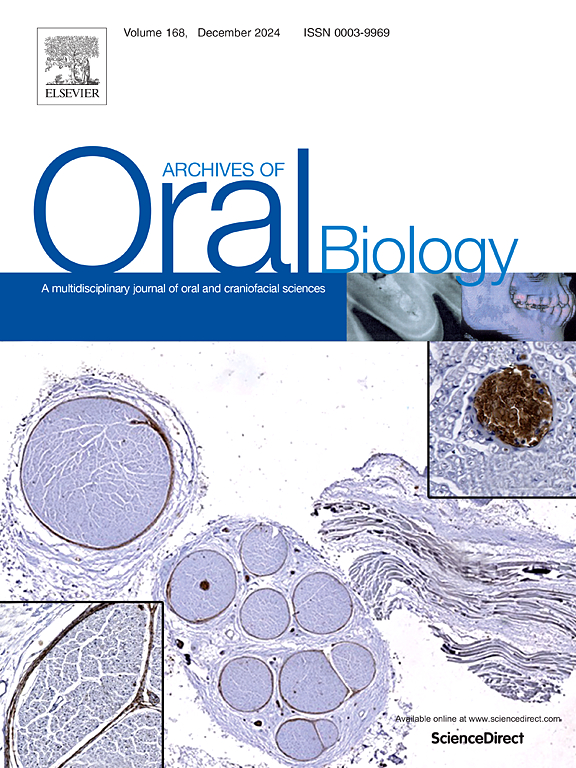Macrophage depletion in male mice impairs extraction socket healing by disrupting bone regeneration and tissue repair
IF 2.2
4区 医学
Q2 DENTISTRY, ORAL SURGERY & MEDICINE
引用次数: 0
Abstract
Objectives
Macrophages play a critical role in tissue repair and bone regeneration by regulating inflammation, angiogenesis, and osteoblast differentiation. The present study examined the role of macrophages in extraction socket healing using a clodronate liposome-induced macrophage depletion model in mice, with a focus on both soft and hard tissue regeneration. We also investigated the involvement of cytokines, such as TGF-β, PDGF, and BMP2.
Design
Male C57BL/6 J mice were intravenously administered clodronate or control liposomes three days prior to tooth extraction and the healing process was analyzed by histology, immunohistochemistry, RNA in situ hybridization, and quantitative RT-PCR.
Results
The clodronate liposome treatment significantly reduced F4/80-positive and CD206-positive macrophages, delayed mucosal closure, disrupted angiogenesis, and suppressed new bone formation. Vascular density in the extraction socket was significantly reduced, and was accompanied by decreases in the expression of PDGF-A and PDGF-B, which are critical for mesenchymal stem cell migration and angiogenesis. The expression of BMP2 and TGF-β and their downstream signaling were also suppressed, which impaired new bone formation.
Conclusion
These results demonstrate that macrophages are essential for the cytokine-mediated coordination of soft and hard tissue regeneration and highlight their therapeutic potential to improve periodontal and bone regeneration treatments. Because all experiments were performed in male C57BL/6 mice, these findings may not fully extend to females, in which estrogen is known to modulate macrophage function and bone healing.
雄性小鼠巨噬细胞耗竭通过破坏骨再生和组织修复损害拔牙窝愈合
目的巨噬细胞通过调节炎症、血管生成和成骨细胞分化,在组织修复和骨再生中发挥关键作用。本研究利用氯膦酸脂质体诱导的小鼠巨噬细胞耗竭模型,研究了巨噬细胞在拔牙窝愈合中的作用,重点关注软硬组织再生。我们还研究了细胞因子的参与,如TGF-β、PDGF和BMP2。设计雄性C57BL/6 J小鼠在拔牙前3天静脉给予氯膦酸盐或对照脂质体,通过组织学、免疫组织化学、RNA原位杂交和定量RT-PCR分析愈合过程。结果氯膦酸脂质体治疗显著降低f4 /80阳性和cd206阳性巨噬细胞,延迟粘膜闭合,破坏血管生成,抑制新骨形成。拔牙槽内血管密度显著降低,PDGF-A和PDGF-B表达减少,而PDGF-A和PDGF-B对间充质干细胞迁移和血管生成至关重要。BMP2和TGF-β及其下游信号的表达也被抑制,从而阻碍新骨的形成。结论巨噬细胞在细胞因子介导的软硬组织再生中发挥着重要作用,在牙周和骨再生治疗中具有重要作用。因为所有的实验都是在雄性C57BL/6小鼠中进行的,这些发现可能并不完全适用于雌性,雌性雌激素已知可以调节巨噬细胞功能和骨愈合。
本文章由计算机程序翻译,如有差异,请以英文原文为准。
求助全文
约1分钟内获得全文
求助全文
来源期刊

Archives of oral biology
医学-牙科与口腔外科
CiteScore
5.10
自引率
3.30%
发文量
177
审稿时长
26 days
期刊介绍:
Archives of Oral Biology is an international journal which aims to publish papers of the highest scientific quality in the oral and craniofacial sciences. The journal is particularly interested in research which advances knowledge in the mechanisms of craniofacial development and disease, including:
Cell and molecular biology
Molecular genetics
Immunology
Pathogenesis
Cellular microbiology
Embryology
Syndromology
Forensic dentistry
 求助内容:
求助内容: 应助结果提醒方式:
应助结果提醒方式:


